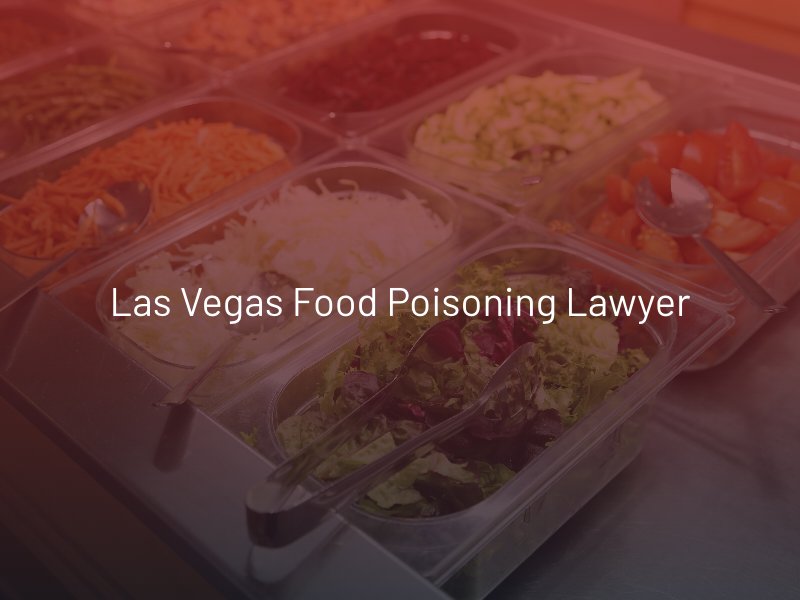Las Vegas Food Poisoning Attorney
If you or a loved one suffered from food poisoning, you may be able to recover compensation. Speak with a Las Vegas food poisoning lawyer from Harris & Harris Injury Lawyers to learn about your legal options.
One of the unfortunate side effects of an efficient national food system is the ease with which dangerous food can be distributed all across the country causing severe cases of food poisoning. Eggs tainted with salmonella at one farm could be found in kitchens in five states or in commercial foods sold nationwide.

How Can a Food Poisoning Lawyer Help?
A knowledgeable food poisoning lawyer can assist you in many ways after a diagnosis. Many victims suffering from foodborne illnesses are entitled to compensation but end up settling for less than they deserve. With the assistance of a lawyer, you can improve your chances of maximizing your recovery and avoid being pressured into settling for less than your case’s value. A skilled food poisoning lawyer in Las Vegas can do the following on your behalf:
- Take the time to investigate all potentially liable parties and collect the evidence you need to hold them accountable.
- Deal with the insurance company while you concentrate on your recovery.
- Estimate future medical costs and other food poisoning-related expenses to give you a better idea of your case’s worth and the amount of compensation you need.
- Deal with hospitals or any debt collectors looking for payment for your medical and food poisoning-related bills, and inform them of your pending claim.
- Filing any necessary paperwork and ensuring you meet deadlines.
Many food poisoning claims are settled outside of court, but representing yourself can leave you vulnerable to an unfairly low settlement offer or claim denial. A personal injury lawyer in Las Vegas experienced with these types of cases understands the laws applicable to your case and will ensure you recover the compensation you deserve. Additionally, most food poisoning lawyers will accept your case on a contingency fee basis, which means you do not have to pay any money upfront, and you only owe legal fees if you win. Therefore, there is no risk to you.
The Harris & Harris injury compensation lawyers in Las Vegas understand the challenges that clients could be living with if they’re suffering the long-term consequences of food contamination. Food poisoning can lead to serious consequences, so if you have been a victim of food poisoning you should call us immediately. We will fight for the compensation and treatment that you deserve!
How Long Do I Have to File a Food Poisoning Claim?
Nevada allows victims two years to file a food poisoning claim, beginning from the date the incident occurred. This law is known as the statute of limitations, which is in place to ensure that lawsuits are dealt with in a timely manner so that evidence remains available. If you fail to pursue a claim within the two-year timeframe, it will result in your case being dismissed by the court, and you will be barred from recovering compensation.
Two years sounds like a long time, but it is typically in your best interests to begin the claims process relatively. Once too much time passes, tracing the source of your food poisoning and identifying evidence can be challenging. However, building your case and resolving it are two different topics. Most attorneys would advise you to wait to settle your claim until you have completely recovered or reach “maximum medical improvement” (MMI). That way, you understand the full extent of your harm, possible complications, and any long-term impact your illness will have on your life.
What Damages Can I Recover for Food Poisoning?
The damages available will depend on your specific case and the types of losses you have suffered. However, the types of damages often recovered in a food poisoning case include the following:
Economic Damages
Economic damages are intended to reimburse a victim for their actual monetary losses. For example:
- Medical Bills and Expenses: All current and future costs of medical care related to your food poisoning, for instance, hospital stays, doctor visits, prescription medications, transportation expenses to the hospital or doctor, etc.
- Lost Wages: Due to your illness, you may need to take time off from work while you recover. Compensation for current and future lost wages can be recovered, as well as diminished earning capacity if you suffer severe complications and cannot return to work or must go into a different line of work. Diminished earning capacity is compensation for the anticipated difference in income that you can make now compared to before your illness.
Non-Economic Damages
Non-economic damages is compensation for subjective losses caused by food poisoning. However, their value can be challenging to calculate because they are not actual financial losses. For example:
- Pain and Suffering / Emotional Distress: Compensation for the physical pain and discomfort you endured as a result of your food poisoning. A journal of your daily symptoms and how they limited your activities can be one form of evidence to help prove the extent of your pain and suffering. Compensation may also be available for any emotional distress caused by your illness (e.g., depression, anxiety, insomnia, PTSD). Insurance companies may use a multiplier method to find an appropriate figure for pain and suffering damages. This formula involves multiplying your economic damages by a number between 1.5 and 5, chosen based on the severity of your illness.
- Physical Impairment or Disfigurement: You are owed compensation if you suffered a disability or other physiological conditions as a result of your food poisoning, which can lead to embarrassment and avoidance of certain activities.
- Loss of Enjoyment of Life: If you experienced a decrease in your quality of life or overall life satisfaction, compensation can be recovered for your loss of enjoyment.
Punitive Damages
Depending on the degree of negligence committed by the defendant (at-fault party), it may be possible to obtain punitive damages. However, unlike other types of compensation, the court will only award punitive damages in certain cases as they are meant to punish the liable party for egregious behavior.
Who is Liable in Food Poisoning Cases?
Who can be held responsible when contaminated food causes serious illness or death? Consumers can bring a product liability lawsuit against the parties whose unhealthy business practices resulted in food poisoning. That could be:
- The farmer who had unsanitary conditions on the farm, resulting in salmonella on sprouts or cantaloupe
- The meatpacking company where unsanitary conditions contaminated meat with feces carrying E. coli
- The produce handler where unsanitary conditions transferred listeria monocytogenes bacteria to lettuce or staphylococcus aureus to cheese
- The food producer that failed to do quality tests or allowed one product to be contaminated by another product (for example, peanut or milk contamination)
What Causes Food Poisoning?
There are more than 200 pathogens that can contaminate food, but five are responsible for most foodborne illnesses:
Campylobacter
An infectious disease caused by the bacterium Campylobacter jejuni. It is commonly contracted by eating raw or undercooked poultry or food that it has touched, resulting in cross-contamination. Campylobacter often causes bloody diarrhea, fever, and stomach cramps two to five days after exposure. Potential complications include irritable bowel syndrome, arthritis, or a serious disorder called Guillain – Barre Syndrome (temporary paralysis).
E. Coli
An illness caused by the bacterium Escherichia coli O157:H7. It is characterized by severe abdominal cramps and bloody diarrhea and can also lead to a severe complication known as Hemolytic Uremic Syndrome (HUS).
Listeria Monocytogenes
The bacterium Listeria monocytogenes causes an infection known as Listeriosis. This illness is particularly dangerous for newborn infants, pregnant women, and the elderly. Potential symptoms include fever, muscle aches, headache, stiff neck, loss of balance, confusion, convulsions, or diarrhea.
Salmonella
Salmonella causes an infection called Salmonellosis, which is transmitted when ingesting food that is contaminated with animal feces. Symptoms often include diarrhea, fever, and abdominal cramps. However, Salmonellosis can be life-threatening in some cases or cause long-term complications, such as Reactive Arthritis (Reiter’s Syndrome).
Toxoplasma Gondii
This parasite is a leading cause of death related to foodborne illness. Over 40 million people carry this parasite in the U.S., but their immune systems keep it from causing symptoms. However, when anyone with a compromised immune system or women become newly infected shortly before or during pregnancy, they can experience severe symptoms, including fever, confusion, headache, seizures, nausea, and poor coordination. Pregnant women may suffer a miscarriage, a stillborn child, or their infant may have signs of congenital toxoplasmosis.
Any food can become contaminated when it is not handled properly, which is why it is critical to choose restaurants carefully, thoroughly wash fruits and vegetables, watch out for cross-contamination, and always cook food to recommended temperatures.
What are Symptoms of Food Poisoning?
While the most common symptom of food poisoning is temporary diarrhea and vomiting, some people suffer serious, long-term injuries and even death. Here are some of the extreme situations that we have come up against:
- Campylobacter infection can cause paralysis, arthritis, and infections of the heart and blood.
- E. coli can lead to kidney failure in children, kidney disease in adults, anemia, neurological problems, and diabetes. E. coli causes more deaths than any other food-borne bacteria.
- Listeria Monocytogenes can result in miscarriage, premature birth, and stillbirth. It can result in brain and spinal cord infections and about 20 percent of people who develop an infection die from it.
- Salmonella can result in reactive arthritis.
- Toxoplasma Gondii can lead to vision problems and cognitive difficulties.
Proper food-handling techniques and hygienic food processing can eliminate food-borne illnesses like these, and yet companies fail to take the precautions necessary to safeguard our health.
What to Do if You Suspect Food Poisoning
If you suspect you have food poisoning, preserve any food that you believe may be the culprit, as well as any receipts, if possible. Most food poisoning cases resolve themselves after a day or two, but if you are experiencing severe symptoms, see a doctor as soon as possible. Let them know you suspect food poisoning so they can run the appropriate tests. After your diagnosis, continue to focus on your recovery and any ongoing treatment recommended by your physician. When you are able, write down everything you can remember eating in the days previous to becoming ill. Try to include the following information:
- What you ate
- Where you ate it
- When you ate it
- How it was prepared
- A log of your daily symptoms
- How your everyday life has been impacted by your food poisoning.
Your physician may have already reported your foodborne illness to the local health department, but if not, you can notify them. The Nevada Division of Public and Behavioral Health – Environmental Health Section is responsible for handling complaints related to illness from the consumption of food made in Las Vegas. The Complaint Line is (775) 684-5280.
When you speak to a representative, you can ask if there have been other recent reports of similar illnesses. Continue keeping a journal of your everyday symptoms and speak to an experienced Las Vegas food poisoning attorney as soon as possible. They can discuss your rights, how to preserve evidence and next steps.
Speak with a Las Vegas Food Poisoning Attorney
At Harris & Harris Injury Lawyers, we understand the challenges you are living with if you’re suffering the long-term consequences of food contamination. We are aggressive in pursuing the facts and in holding companies responsible wherever they are in the chain from farm to table. We work hard to ensure our clients receive full and fair compensation for all injuries.
Do not hesitate to contact an experienced food poisoning lawyer right away. Contact us online or call (702) 384-1414 or toll-free 1 (800) 393-2350. Your consultation is free.


